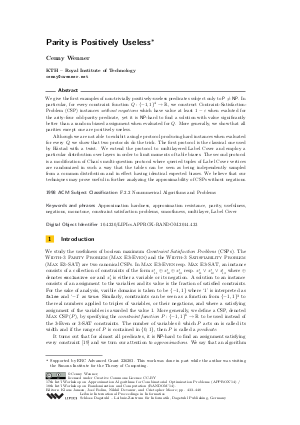Parity is Positively Useless
Author Cenny Wenner
-
Part of:
Volume:
Approximation, Randomization, and Combinatorial Optimization. Algorithms and Techniques (APPROX/RANDOM 2014)
Part of: Series: Leibniz International Proceedings in Informatics (LIPIcs)
Part of: Conference: International Conference on Randomization and Computation (RANDOM)
Part of: Conference: International Conference on Approximation Algorithms for Combinatorial Optimization Problems (APPROX) - License:
 Creative Commons Attribution 3.0 Unported license
Creative Commons Attribution 3.0 Unported license
- Publication Date: 2014-09-04
File

PDF
LIPIcs.APPROX-RANDOM.2014.433.pdf
- Filesize: 0.59 MB
- 16 pages
Document Identifiers
Subject Classification
Keywords
- Approximation hardness
- approximation resistance
- parity
- usefulness
- negations
- monotone
- constraint satisfaction problems
- smoothness
- multilayer
- L
Metrics
- Access Statistics
-
Total Accesses (updated on a weekly basis)
0PDF Downloads0Metadata Views
Abstract
We give the first examples of non-trivially positively-useless predicates subject only to P != NP. In particular, for every constraint function Q : {-1,1}^4 -> R, we construct Contraint-Satisfaction-Problem (CSP) instances without negations which have value at least 1-eps when evaluted for the arity-four odd-parity predicate, yet it is NP-hard to find a solution with value significantly better than a random biased assignment when evaluated for Q. More generally, we show that all parities except one are positively useless.
Although we are not able to exhibit a single protocol producing hard instances when evaluated for every Q, we show that two protocols do the trick. The first protocol is the classical one used by Håstad with a twist. We extend the protocol to multilayered Label Cover and employ a particular distribution over layers in order to limit moments of table biases. The second protocol is a modification of Chan's multi-question protocol where queried tuples of Label Cover vertices are randomized in such a way that the tables can be seen as being independently sampled from a common distribution and in effect having identical expected biases. We believe that our techniques may prove useful in further analyzing the approximability of CSPs without negations.
Cite As Get BibTex
Cenny Wenner. Parity is Positively Useless. In Approximation, Randomization, and Combinatorial Optimization. Algorithms and Techniques (APPROX/RANDOM 2014). Leibniz International Proceedings in Informatics (LIPIcs), Volume 28, pp. 433-448, Schloss Dagstuhl – Leibniz-Zentrum für Informatik (2014)
https://doi.org/10.4230/LIPIcs.APPROX-RANDOM.2014.433
BibTex
@InProceedings{wenner:LIPIcs.APPROX-RANDOM.2014.433,
author = {Wenner, Cenny},
title = {{Parity is Positively Useless}},
booktitle = {Approximation, Randomization, and Combinatorial Optimization. Algorithms and Techniques (APPROX/RANDOM 2014)},
pages = {433--448},
series = {Leibniz International Proceedings in Informatics (LIPIcs)},
ISBN = {978-3-939897-74-3},
ISSN = {1868-8969},
year = {2014},
volume = {28},
editor = {Jansen, Klaus and Rolim, Jos\'{e} and Devanur, Nikhil R. and Moore, Cristopher},
publisher = {Schloss Dagstuhl -- Leibniz-Zentrum f{\"u}r Informatik},
address = {Dagstuhl, Germany},
URL = {https://drops.dagstuhl.de/entities/document/10.4230/LIPIcs.APPROX-RANDOM.2014.433},
URN = {urn:nbn:de:0030-drops-47144},
doi = {10.4230/LIPIcs.APPROX-RANDOM.2014.433},
annote = {Keywords: Approximation hardness, approximation resistance, parity, usefulness, negations, monotone, constraint satisfaction problems, smoothness, multilayer, L}
}
Author Details
References
-
Per Austrin and Johan Håstad. On the usefulness of predicates. TOCT, 5(1):1, 2013.

-
Per Austrin and Elchanan Mossel. Approximation resistant predicates from pairwise independence. Computational Complexity, 18(2):249-271, 2009.

-
Siu On Chan. Approximation resistance from pairwise independent subgroups. In STOC, pages 447-456, 2013.

-
Irit Dinur, Venkatesan Guruswami, Subhash Khot, and Oded Regev. A new multilayered pcp and the hardness of hypergraph vertex cover. SIAM J. Comput., 34(5), 2005.

-
Uriel Feige, Guy Kindler, and Ryan O'Donnell. Understanding parallel repetition requires understanding foams. In IEEE Conference on Computational Complexity, 2007.

-
Michel X. Goemans and David P. Williamson. Improved approximation algorithms for maximum cut and satisfiability problems using semidefinite programming. J. ACM, 1995.

-
Venkatesan Guruswami. Inapproximability results for set splitting and satisfiability problems with no mixed clauses. Algorithmica, 38(3):451-469, 2003.

-
Venkatesan Guruswami, Johan Håstad, Rajsekar Manokaran, Prasad Raghavendra, and Moses Charikar. Beating the random ordering is hard: Every ordering csp is approximation resistant. SIAM J. Comput., 40(3):878-914, 2011.

-
Venkatesan Guruswami, Prasad Raghavendra, Rishi Saket, and Yi Wu. Bypassing ugc from some optimal geometric inapproximability results. In SODA, 2012.

-
Johan Håstad. Some optimal inapproximability results. J. ACM, 48(4):798-859, 2001.

-
Johan Håstad. On the approximation resistance of a random predicate. Computational Complexity, 18(3):413-434, 2009.

-
Jonas Holmerin and Subhash Khot. A new pcp outer verifier with applications to homogeneous linear equations and max-bisection. In STOC, 2004.

-
Subhash Khot. Hardness results for coloring 3 -colorable 3 -uniform hypergraphs. In FOCS, pages 23-32, 2002.

-
Subhash Khot. On the power of unique 2-prover 1-round games. In STOC, 2002.

-
Subhash Khot, Guy Kindler, Elchanan Mossel, and Ryan O'Donnell. Optimal inapproximability results for max-cut and other 2-variable csps? SIAM J. Comput., 37(1), 2007.

-
Subhash Khot, Madhur Tulsiani, and Pratik Worah. A characterization of strong approximation resistance. CoRR, abs/1305.5500, 2013.

-
Subhash Khot and Nisheeth K. Vishnoi. The unique games conjecture, integrality gap for cut problems and embeddability of negative type metrics into l_1. In FOCS, 2005.

-
Elchanan Mossel. Gaussian bounds for noise correlation of functions. Geometric and Functional Analysis, 19, 2010.

-
Thomas J. Schaefer. The complexity of satisfiability problems. In STOC, 1978.

-
Luca Trevisan, Gregory B. Sorkin, Madhu Sudan, and David P. Williamson. Gadgets, approximation, and linear programming. SIAM J. Comput., 29(6):2074-2097, 2000.

